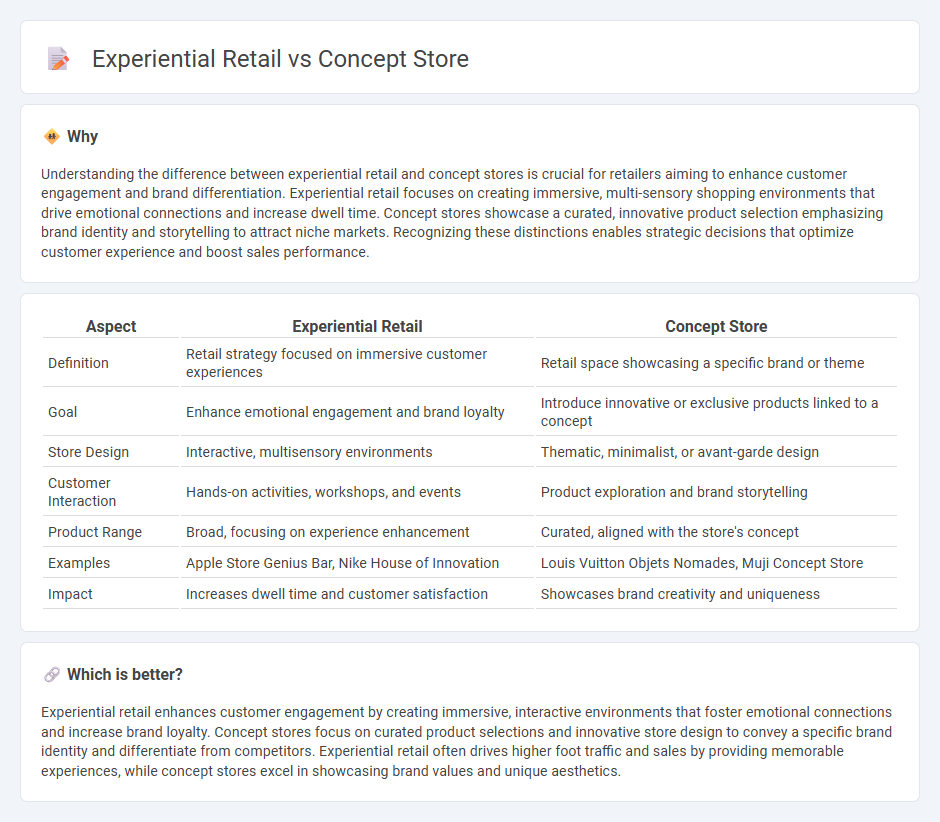
Experiential retail transforms shopping into an immersive event, engaging customers through interactive displays and personalized experiences, while concept stores focus on a curated theme or lifestyle to showcase unique, often limited-edition products. Both models prioritize customer engagement but differ in approach: experiential retail emphasizes sensory involvement, whereas concept stores center around a cohesive brand narrative and innovative design. Explore how these retail strategies redefine consumer interaction and enhance brand loyalty.
Why it is important
Understanding the difference between experiential retail and concept stores is crucial for retailers aiming to enhance customer engagement and brand differentiation. Experiential retail focuses on creating immersive, multi-sensory shopping environments that drive emotional connections and increase dwell time. Concept stores showcase a curated, innovative product selection emphasizing brand identity and storytelling to attract niche markets. Recognizing these distinctions enables strategic decisions that optimize customer experience and boost sales performance.
Comparison Table
| Aspect | Experiential Retail | Concept Store |
|---|---|---|
| Definition | Retail strategy focused on immersive customer experiences | Retail space showcasing a specific brand or theme |
| Goal | Enhance emotional engagement and brand loyalty | Introduce innovative or exclusive products linked to a concept |
| Store Design | Interactive, multisensory environments | Thematic, minimalist, or avant-garde design |
| Customer Interaction | Hands-on activities, workshops, and events | Product exploration and brand storytelling |
| Product Range | Broad, focusing on experience enhancement | Curated, aligned with the store's concept |
| Examples | Apple Store Genius Bar, Nike House of Innovation | Louis Vuitton Objets Nomades, Muji Concept Store |
| Impact | Increases dwell time and customer satisfaction | Showcases brand creativity and uniqueness |
Which is better?
Experiential retail enhances customer engagement by creating immersive, interactive environments that foster emotional connections and increase brand loyalty. Concept stores focus on curated product selections and innovative store design to convey a specific brand identity and differentiate from competitors. Experiential retail often drives higher foot traffic and sales by providing memorable experiences, while concept stores excel in showcasing brand values and unique aesthetics.
Connection
Experiential retail transforms traditional shopping into immersive experiences, engaging customers through interactive displays, personalized services, and sensory elements. Concept stores embody experiential retail by curating unique, themed environments that blend product discovery with lifestyle storytelling, creating emotional connections with shoppers. Both models prioritize customer engagement and brand differentiation, driving loyalty through memorable, multi-sensory retail encounters.
Key Terms
Curated Selection
Concept stores emphasize a curated selection that reflects a unique lifestyle or theme, blending products, art, and design to create a distinct brand narrative. Experiential retail centers on immersive, sensory experiences where curated product choices enhance customer engagement and emotional connection. Discover how curated selections transform shopping into memorable journeys and deepen brand loyalty.
Immersive Environment
Concept stores create immersive environments by blending curated product selections with distinctive design elements that tell a cohesive brand story, enhancing customer engagement and loyalty. Experiential retail expands this by incorporating interactive technologies, multisensory stimuli, and personalized experiences that transform shopping into a memorable event. Explore how immersive environments shape modern retail strategies and elevate consumer connections.
Customer Engagement
Concept stores create immersive brand environments that showcase curated product collections, enhancing customer interaction through thematic design and storytelling elements. Experiential retail focuses on multisensory experiences, incorporating interactive technology and personalized services to deepen emotional connections and foster brand loyalty. Explore how these innovative retail strategies transform customer engagement in dynamic marketplaces.
Source and External Links
What is a Concept Store? - A Concept Store offers a complete, immersive shopping experience combining varied elements like design, art, gastronomy, technology, and cultural events, differing from traditional stores by having a strong, unique identity and atmosphere.
What is a concept store? - A concept store sells a carefully curated selection of products connected to an overarching theme, often evoking a lifestyle and including experiential elements like cafes or event spaces to build community around that lifestyle.
13 of the Best Concept Stores Worldwide - Concept stores create immersive shopping experiences by combining curated collections, art galleries, cafes, and unique atmospheres that go beyond traditional retail, emphasizing personality and customer engagement.
 dowidth.com
dowidth.com